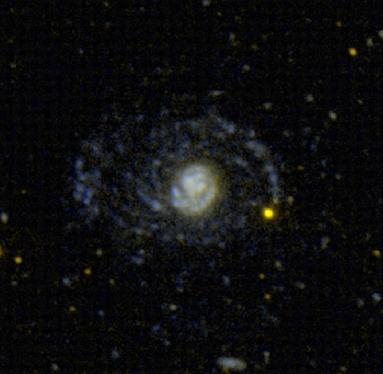NGC 4625 on:
[Wikipedia]
[Google]
[Amazon]
NGC 4625 is a distorted
 Unlike most
Unlike most
dwarf galaxy
A dwarf galaxy is a small galaxy composed of about 1000 up to several billion stars, as compared to the Milky Way's 200–400 billion stars. The Large Magellanic Cloud, which closely orbits the Milky Way and contains over 30 billion stars, is s ...
in the constellation Canes Venatici. The galaxy is formally classified as a Sm galaxy, which means that its structure vaguely resembles the structure of spiral galaxies
Spiral galaxies form a class of galaxy originally described by Edwin Hubble in his 1936 work ''The Realm of the Nebulae''Magellanic spiral
Magellanic spiral galaxies are (usually) dwarf galaxies which are classified as the type Sm (and SAm, SBm, SABm). They are galaxies with one single spiral arm, and are named after their prototype, the Large Magellanic Cloud, an SBm galaxy. They ca ...
because of its resemblance to the Magellanic clouds
The Magellanic Clouds (''Magellanic system'' or ''Nubeculae Magellani'') are two irregular dwarf galaxies in the southern celestial hemisphere. Orbiting the Milky Way galaxy, these satellite galaxies are members of the Local Group. Because bo ...
.
Structure
 Unlike most
Unlike most spiral galaxies
Spiral galaxies form a class of galaxy originally described by Edwin Hubble in his 1936 work ''The Realm of the Nebulae''spiral arm
Spiral galaxies form a class of galaxy originally described by Edwin Hubble in his 1936 work ''The Realm of the Nebulae'' It has been hypothesized that this galaxy's asymmetric structure may be the result of a gravitational interaction with NGC 4618. Such asymmetric structure is commonly seen among many interacting galaxies. However, observations of neutral
hydrogen
Hydrogen is the chemical element with the symbol H and atomic number 1. Hydrogen is the lightest element. At standard conditions hydrogen is a gas of diatomic molecules having the formula . It is colorless, odorless, tasteless, non-toxic ...
gas in NGC 4618 and NGC 4625 show that NGC 4625 does not appear to have been affected by the gravitational interaction. This indicates that the single-arm structure seen in NGC 4625 may be created through intrinsic processes.
Ultraviolet
Ultraviolet (UV) is a form of electromagnetic radiation with wavelength from 10 nm (with a corresponding frequency around 30 PHz) to 400 nm (750 THz), shorter than that of visible light, but longer than X-rays. UV radiati ...
observations of NGC 4625 made by the Galaxy Evolution Explorer (GALEX) show the presence of an extended disk. The new spiral disk extrends 28,000 light-years from the galaxy center, a staggering four times the optical radius. The hot blue stars in this new disk may have formed from the inflow of fresh gas and dust from interaction with its companions, NGC 4618 and NGC 4625A. The UV-to-optical colors suggest that the bulk of the stars in the disk of NGC 4625 are currently being formed, providing a unique opportunity to study today the physics of star formation under conditions similar to those when the normal disks of spiral galaxies like the Milky Way first formed.
Environment
As mentioned above, NGC 4625 is interacting with NGC 4618.See also
* NGC 5713 - ''a similar asymmetric spiral galaxy''References
External links
* {{DEFAULTSORT:NGC 4625 Canes II Group Peculiar galaxies Intermediate spiral galaxies Interacting galaxies Canes Venatici 4625 IC objects 07861 42607